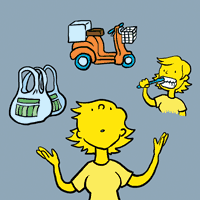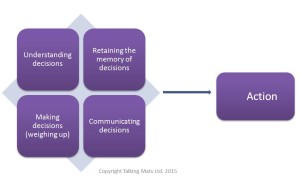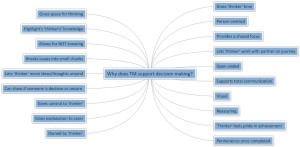We are delighted to announce the release of Version 2 of the Talking Mats App
This app has a number of great new features which many of you have been asking for.
There are two new resources – Eating and Drinking – which has 3 main topic sets – Meals, Impact on Health and Things that might help.
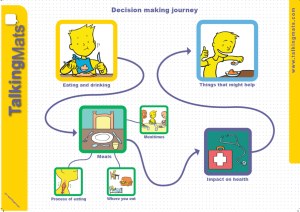
There is an amazing new feature which many people have been asking for. Version 2 allows you to add your own images from your camera roll. This means that you can add you own personalised pictures to any of the topics.
Watch out for next week’s blog when Lois will tell you about her holiday using this new feature!
You can now also reset your password, use the Back button to navigate through the app, delete individual sessions and use the updated report page.
If you have already purchased the gold version of the Talking Mats app you will get all these new features for free.
If you wish to purchase the app please click here or for further information call our office 01786 479511
As part of the Right to Speak initiative Talking Mats was funded to develop ‘Promoting Inclusion and Participation’: an online learning resource for staff working with children and young people who use Alternative Augmentative Communication (AAC). We have been delighted to work with NHS Education Scotland on developing this free resource and also have really enjoyed working in partnership with the learning and development consultancy: Forum Interactive.
The complexity of care for children and young people who use Alternative and Augmentative Communication (AAC) is multifaceted. Ensuring that goals are centred on the young person and family’s needs is a constant challenge to practitioners. There are several resources that focus on developing the technical skills of developing AAC but there is a scarcity of resources that focus on the impact of AAC on the child’s day to day life.
Promoting Inclusion and Participation is based on an earlier project which determined the key indicators of a quality AAC service from the perspective of AAC users and their families.
Promoting Inclusion and Participation uses the following frameworks to help practitioners structure their decision making:
- International Classification of Functioning, Disability and Health – Children and Young People (ICF-CY)
- Janice Light’s Communicative Competencies (2014)
- GIRFEC (Getting It Right For Every Child) wellbeing indicators
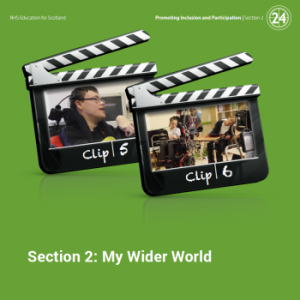
This on-line resource will help practitioners:
- Understand the role that collaboration and involvement play in delivering wellbeing outcomes for children who use AAC.
- Apply a holistic approach and outcomes focused approach to assessment, implementation and review which places the child at the centre.
- Recognise that as the child develops and changes, so the level of different team member’s involvement will ebb and flow.
Download the resource here. It takes a little time to download so be patient !
We would be delighted to receive feedback of how it is being used.
Ref
Light J , Mcnaughton D, Communicative Competence for Individuals who require Augmentative and Alternative Communication: A New Definition for a New Era of Communication? Augmentative and Alternative Communication, 2014; 30(1): 1–18
Talking Mats is delighted to support Fair Trade through the purchase of new style bags which has come about through the initiative of one of our team, Margo Mackay. She has written the following blog:
The arrival of seven large boxes shipped from Kolkata caused great excitement in the Talking Mats office last week. For me personally opening up the boxes from the Freeset factory immediately brought a series of images to mind. Just over one year ago, at the start of 2014, I was part of a delegation of Scottish women who visited India to see businesses set up to help women who had been trafficked.
A tour around the factory revealed well organised systems with women busy working in production; cutting, sewing and printing bags ordered from all over the world. A factory like any other but with a significant difference. Most of the employees had previously been trapped in India’s sex trade which had robbed them of dignity. For them, getting a job in the Freeset factory gives the women a chance to regain control of their lives in a caring community.
They are given fair pay and conditions, offered education and health care. They are supported to make their journey out of prostitution and into a new way of living, restoring hope. Although a business, Freeset is also a community. The women are often dealing with health problems (including HIV/AIDS), and psychological effects from abuse and exclusion from society. This makes for a challenging workplace and much effort is put into creating a compassionate environment where the women are supported and their needs met.
As a Social Enterprise business, through selling our Talking Mats products, we are now participating in a woman’s journey to freedom. The transformation in women’s lives is clearly apparent, simply because they’ve been given a chance. We are proud to be supporting this enterprise.
Why don’t you have a look for yourself on their website? http://freesetglobal.com/
And why don’t you treat yourself to one of these attractive bags by buying one of our products
Talking Mats is delighted to announce that we have developed our own doggy Talking Mat to allow us to find out the views of our canine friends . Sally has been busy working on this as her swan song to Talking Mats . Sally has always been passionate about ensuring that pets are fully included in every Talking Mat. The Talking Mat for your dog launches on the 1st of April the day she starts her new job.
Good Luck to Sally in her new role as Head of Education , Research and Practice at Strathcarron Hospice -we know you will be as fab there as you have been here!
NB No dogs were harmed in the production of this resource.
In June 2012 the Scottish Government published “A Right to Speak” (Scottish Government 2012) which included a four million pound fund to help improve services in Scotland for people who use Alternative and Augmentative Communication (AAC). At that time we were a small fledging social enterprise with a vision to improve the lives of people with communication difficulties in Scotland. We have been fortunate to be able to make our contribution to Right to Speak and as the initiative ends at the end of this month it is good to reflect on the work that we have contributed to over the past 3 years.
AAC outcomes
At the beginning we were heavily involved in the research aspect of the project, carrying out a critical appraisal of outcomes for people working in AAC. This led onto a second project to evaluate the validity and reliability of the Therapy Outcome Measure for AAC. We were pleased to be able to do this in conjunction with Prof Pam Enderby and a number of AAC professionals throughout Scotland. The Therapy Outcomes Measures, third edition has just been published which includes a section on AAC co-written with Joan and Sally. This should allow professionals to be much more specific in monitoring and measuring the impact of AAC intervention.
Quality indicators
A second piece of research we carried out was to explore what matters to AAC users in terms of service delivery. It was a great privilege to listen to the views of people who use AAC from all over Scotland and we were able to theme those views into 10 key quality indicators. This led on to one AAC partnership asking us to design a Talking Mat to enable AAC users to give feedback on their service. This was successful and NHS Education then asked us to roll that out across Scotland. 40 people have just attended 4 specialist seminars and received the resource. We believe that taking the time to listen to people and ask for feedback in a structured way is really important and so to continue to support that we are making the ‘Talking Mats AAC feedback’ script ,symbol set people and symbols set services available on the free stuff section of our web site.
Promoting Inclusion and Participation
We were fortunate to win the tender to design an online learning resource for staff working with children and young people. It is designed to help professionals take a holistic and values based approach to working with young people to support their health and wellbeing. The resource contains a collection of film clips that depict three different environments in which young people use AAC: a mainstream primary school, a mainstream high school and a specialist school. It provides a Learner’s Workbook which shows the learner how to use the film clips to improve the way they promote inclusion and participation for young AAC users. It will support equip practitioners to shift from a model of working where interventions are done to the child/young person to a process where work is done with children and families to focus on what is important to them. It is about to launch on the NHS Education web site.
Training and accredited training
There has been a significant focus on developing a well trained staff through the right to speak initiative and helping people understand about communication. We have been delighted to play our role in that. Up and down Scotland we have run training courses for different AAC partnerships e.g Lanarkshire, Fife, Highland, Western Isles, Tayside. We have also had people coming to train here in Stirling .We are particularly pleased that there have been several people who have completed their accredited trainers and who will be able to continue and sustain training in their local area. In one Health board for example, there is a plan to train a further 300 front line staff in Talking Mats
Moving forward
It’s been a busy 3 years and it’s both exciting and gratifying that so many more people know about AAC and know that it is not a responsibility that rests with just one profession . The complexity of communication means we all have to play our part but we all recognise there is still much to do to really ensure people who use AAC are fully included in society.
As a social enterprise we would no longer describe ourselves as ‘fledgling’ –we have well and truly hatched ! We are grateful that during our critical start-up period winning tenders for right to speak also helped us on our journey. We will continue to fulfil our vision of supporting people with communication difficulties and we recognise right to speak has given us a legacy of research and resources that will help us do that.
We are delighted that Sally, our Senior Associate, has been offered the post of Head of Department for Palliative Care Education, Research and Practice Development at Strathcarron Hospice. We swing from being magnanimous to distraught!! – but it’s a wonderful opportunity for her and she will be a fantastic asset to their department. We will continue to work closely with her but we will really miss her as she has a key role in our team.
However, it also means that we are looking for another person to join us. See attached job description.
TM Associate job description
We are looking for a full time person to join the Talking Mats Team and depending on experience, level of skills and business acumen, the post will be either ‘Talking Mats Associate’ or Talking Mats Senior Associate.
The key roles are:
- To work with the Talking Mats team to provide high quality training throughout the UK and occasionally abroad
- To take a lead in gaining, developing and carrying out consultancy and project work
- To develop, launch, take products to market and increase sales
- To contribute, as agreed, to the day-to-day running of Talking Mats Limited
- To deputise for Directors as required
The closing date for applications is Thursday 26th March and the date for interviews is Thursday 2nd April.
If you are interested and think you would like to join our dynamic team please send a cover letter with your CV to joan@talkingmats.com or lois@talkingmats.com
Also, don’t hesitate to get in touch if you need any other information either by email or phone 01786479511
The inability to make a decision could be because of a learning disability, mental health problems, brain injury, dementia, alcohol or drug misuse, side effects of medical treatment or any other illness or disability. Click here for further information.
Both the Mental Capacity Act (2005) in England and Wales and the Adults with Incapacity Scotland Act (2000) identify the following components which determine whether or not someone has capacity to make their own decisions.
There are a number of additional assumptions that are central to determining whether or not someone has the capacity to make their own decisions:
• Every adult has the right to make decisions unless proved otherwise
• Everyone should be supported to make their own decisions
• People should be given the support they need
• People are entitled to make their decision – good or bad
• Each individual has a different capacity to make decisions about different aspects of their life.
We have been running seminars on how Talking Mats can be used to support a person’s capacity to make decisions.The diagram below illustrates some of the comments we received form participants at a recent seminar about the benefits of using Talking Mats to support decision making.
Click on the diagram to enlarge.
The process of completing a Talking Mat helps people retain their view and if they have memory problems the picture of the mat is a good prompt to enable recall.
Its worth noting that our brain processes visual images 60,000 faster than text!
Getting feedback on AAC services is particularly challenging because of the communication support needs of this group of people. It is therefore really important for AAC users to have the chance to say how they feel about the services they receive. Services need to make sure that this group of people have a voice and that there is a mechanism for their views to be taken into account in monitoring the quality of services and service planning.
NES has funded the opportunity for professionals to attend a seminar and go away with a resource to support them to get feedback from AAC users about their service. The Talking Mats resource was trialled and developed with Forth Valley AAC partnership and is based on AAC quality indicators (NES 2013).
This opportunity is free of charge to people in AAC partnerships in Scotland. You will attend a half day specialist seminar and go away with a free resource to use in practice.
The resource will help people find out how AAC users feel about:
- People who work with them
- How AAC services are delivered
It provides a model of good practice which could be extended to evaluate other services.
4 dates and locations are available.
Edinburgh- Tuesday 17th March 1.45 -4-.30pm
Dundee – Wednesday 18th March 1.45 -4.30pm
Glasgow Thursday 19th March – 1.45 -4.30pm
Inverness Friday 20th March 1.45 -4.30 pm
If you are trained in Talking Mats and wish to take up this great opportunity, please book your place as soon as possible.
sally@talkingmats.com or rhona@talkingmats.com
We really enjoy training people to use Talking Mats and are always inspired by the range of participants who are working hard to support people with communication disabilities. Here is some of the feedback we have received recently from the Talking Mats training courses that we have run.
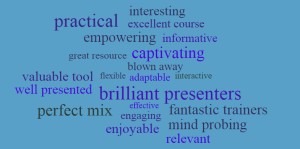
Recently we delivered two Talking Mats specialist seminars in London:
- Talking Mats and the Eating and Drinking resource
- Talking Mats and Capacity
Both seminars were very well attended with lots of discussion from a wide range of professionals.
During the Eating and Drinking seminar, we provided background on how and why the resource was developed and showed some DVD examples of people using the resource. This really brought things to life and showed how important it is to give people (with and without speech) the opportunity to consider and talk about different aspects of eating and drinking. We also gave people hands-on practice in using the symbols from each topic.
Each participant received a copy of the full resource, including symbols, a mat, and explanatory booklet.
During the Capacity seminar we discussed the fundamental principles the Capacity Act and participants had a chance to consider how Talking Mats can help people to:
- understand
- retain/remember
- weigh up information
- communicate their views/wishes and feelings.
They were also given the opportunity to work through some practical examples and think about options to help people understand issues and make decisions.
If you would like to attend our next specialist seminars, we are holding them in Stirling on 17th February: Stirling Seminars Feb 2015 flier
 Online training login
Online training login 

